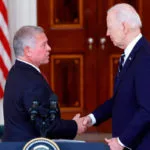
(WASHINGTON) — As the U.S. attempts to push Israel and Hamas closer to an agreement that would see all remaining hostages in Gaza freed in exchange for an extended truce, U.S. officials say CIA Director William Burns will travel to Egypt for negotiations — but that his Israeli counterparts had not yet committed to participating in the talks.
The trip will be Burns’ fourth known trip abroad for face-to-face negotiations on the matter, but it would be his first where neither of the main players is directly represented.
A U.S. official familiar with the matter said Burns would press on with the agenda regardless of Israel’s participation in the talks and meet with intelligence officials from Qatar and Egypt, two countries that have served as effective intermediaries with Hamas through the conflict.
At a White House press availability with the King of Jordan on Monday, President Joe Biden said he was continuing to push for an agreement.
“There are gaps that remain, but I’ve encouraged Israeli leaders to keep working to achieve the deal. The United States will do everything possible to make it happen,” he said.
Even if Israel ultimately participates in this latest round of negotiations, its apparent reluctance to participate in the discussions could be a bad omen overall for the prospects of reaching an agreement.
Roughly 100 hostages may still be alive inside Gaza, according to Israeli authorities. U.S. officials say that figure may include as many as six Americans.
Israeli forces conducted a successful rescue operation in Rafah early Monday, recovering two Israeli men, Fernando Simon Marman, 60, and Luis Har, 70, who were abducted by Hamas during its Oct. 7 attack on Israel.
But while Israel might conduct similar missions in the coming days aimed at freeing some of the detainees, a U.S. official says the vast majority can be recovered only through a diplomatic agreement.
The official also said that although high-level American and Israeli officials are regularly engaged in discussions about a host of topics, the Biden administration did not have a clear idea of Israel’s red lines for a potential deal — highlighting another disconnect between the U.S. and its closest ally in the Middle East.
After Israel signed off on a framework for a hostage exchange in January, officials from Qatar and the U.S. expressed optimism that a deal was within reach.
But last week, Hamas replied with a counterproposal laden with conditions untenable for Israel, including demanding the release of hundreds of Palestinian prisoners convicted of serious offenses and a full withdrawal of Israel troops from Gaza.
Israeli Prime Minister Benjamin Netanyahu quickly rejected Hamas’ offer, slamming it as “delusional.” Secretary of State Antony Blinken acknowledged there were “clear nonstarters” in the group’s proposal, but instated there was still “space for agreement to be reached.”
The evident schism between the U.S. and Israel on hostage negotiations is far from the only area of tension weighing on the relationship.
After the State Department said the U.S. had not seen “any evidence of serious planning” for an Israeli incursion in Rafah, a city in Gaza where more than a million Palestinians are sheltering after Israel directed them there, Netanyahu ordered his military to prepare for a potential a mass evacuation of civilians while simultaneously intensifying strikes on the area.
On Monday, the department’s spokesperson, Matthew Miller, downplayed the latest round of military action in Rafah.
“It is not our assessment that this airstrike is the launch of a full-scale offensive happening,” he said.
But when it comes to military strategy, Israel has maintained a wall of separation with the U.S., and Miller acknowledged that the administration currently had little insight into Israel’s plans for avoiding a new humanitarian catastrophe while conducting a possible incursion into Rafah.
“We look forward to being briefed on it,” he said.
At the White House, Jordan’s king, standing next to Biden, was blunt.
“We cannot afford an Israeli attack on Rafah. It is certain to produce another humanitarian catastrophe,” he said. “The situation is already unbearable for over a million people, who have been pushed into Rafah since the war started. We cannot stand by and let this continue. We need a lasting cease-fire now. This war must end.”
Copyright © 2024, ABC Audio. All rights reserved.
